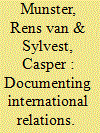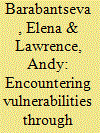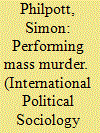|
|
|
Sort Order |
|
|
|
Items / Page
|
|
|
|
|
|
|
| Srl | Item |
| 1 |
ID:
140873


|
|
|
|
|
| Summary/Abstract |
International Relations (IR) is taking a stronger interest in visual practices and representations both as popular imaginaries that shape how we understand and act in the world and as vehicles for teaching empirical events and abstract concepts. The genre of documentary film has, however, received virtually no attention, which is striking given the last decade's explosion of widely circulated documentaries revolving around questions of central importance to IR. In this article we argue that IR needs to take documentary film-making seriously as a separate and significant medium of representation that—moving smoothly between fact and fiction, education and entertainment—directly intervenes in international politics by laying claim to (parts of) truth and reality. To this end, we introduce an analytical framework based on the idea of arrangements of perceptibility, a term that refers to the creative arrangement of sensorial perceptions (saying and showing) in documentary film. We distinguish between three such arrangements, each characterized by a specific theoretical modality (reality, truth, doubt), educational model (instruction, facilitation, problematization), and political efficacy (exposition, disclosure, destabilization). This framework enables a critical analysis of the politics of documentary film, which we demonstrate through a reading of recent documentary films about global politics
|
|
|
|
|
|
|
|
|
|
|
|
|
|
|
|
| 2 |
ID:
139424


|
|
|
|
|
| Summary/Abstract |
In this article we discuss the potential of observational and participatory filmmaking methods to both explore and represent a research subject through a documentary film. We position our project ‘British Born Chinese’ about the experiences of the second generation of Chinese migrants in relation to other recent audio-visual interventions in IR, and present our methodological approach of observational and dialogical engagement with participants and the ethics of representation related to it. In doing this, we explore the potential of audio-visual research to go beyond identity-based forms of inquiries concerning, in particular, migrant and diasporic experiences. Our aim is to develop a situated and contextualised understanding of how and under what conditions individuals resort to racialised forms of belonging. We consider the promise and limitations of observational filmmaking to depart from the structures of representation to evoke alternative solidarities around vulnerability.
|
|
|
|
|
|
|
|
|
|
|
|
|
|
|
|
| 3 |
ID:
155145


|
|
|
|
|
| Summary/Abstract |
The massacre, torture, persecution, and imprisonment of real and imagined communists and sympathizers in mid-1960s Indonesia was among the greatest state-sponsored atrocities of the twentieth century and yet remains little known and even less understood outside Indonesia. An elaborate mythology about the supposed communist coup attempt of September 1965 was foundational to the military government’s legitimacy discourses. The dead, the tortured, and the imprisoned remained an existential threat to Indonesia’s survival according to these discourses, and yet they could not be spoken of, or acknowledged without fear of retribution from the state. This article explores one attempt to break the silence surrounding the massacres and to make visible the suffering of millions of Indonesians; it does so through an analysis of the documentary film, The Act of Killing, in which a number of those involved in mass murder re-enact their killings. It explores the contribution of the film to understanding the politics of mass murder through an interrogation of the history it purports to address and through the methods employed by filmmaker Joshua Oppenheimer. It concludes that while the film is a singular achievement, it fails as a political intervention aimed at deepening understanding of the mass killings.
|
|
|
|
|
|
|
|
|
|
|
|
|
|
|
|
|
|
|
|
|